Content
The rapid development of modern breeding is the source of a huge number of new species of ornamental plants. Hydrangea paniculata Skyfall was first presented at the international exhibition in 2018. The beauty and splendor of her inflorescences guaranteed her attention from both landscape designers and ordinary gardeners.
Description of hydrangea paniculata Skyfall
A feature of the new species is the rather rapid appearance of flowers. Compared to the rest of the paniculate hydrangeas, the flowers of Skyfall Frenne begin to form already in the third year of life. A five-year-old seedling reaches a height of 1.2 m with a crown diameter of about 70 cm.
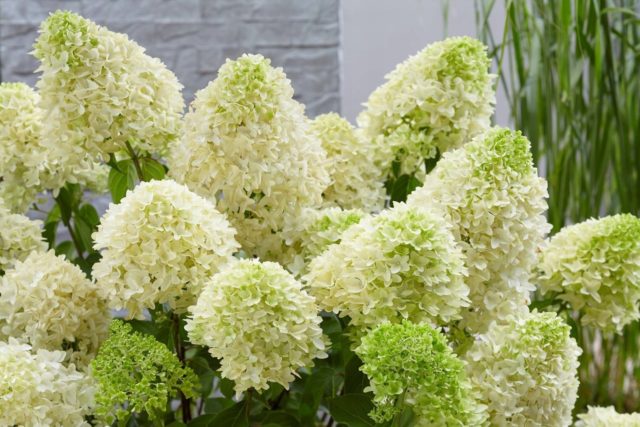
A feature of Skyfall hydrangea is its huge white inflorescences
The most important argument in favor of acquiring Skyfall is its unique bloom. Inflorescences in an adult plant reach up to 30 cm in length with a diameter of up to 20 cm. The first buds appear in mid-July. At this time, the tops of the shoots form large, lush panicles.
The buds are white. Sometimes it is replaced by a slightly greenish or pinkish tint. A feature of this variety of Skyfall hydrangea is its large flower petals. The sizes of the inflorescences make the hydrangea similar to the brighter ornamental plants - lilacs or hyacinths.
Hydrangea paniculata Skyfall in landscape design
Every gardener dreams of a beautifully designed crown of his flowering plants. There are 2 approaches to shaping Skyfall - in the form of a small tree or a lush bush. In the first case, the largest central shoot is left in her, completely removing the rest.
When forming a lush bush, gardeners often face a significant challenge. The inflorescences of Skyfall are so large that, under their weight, the side shoots are bent to the ground. To eliminate such a defect, it is necessary to build supports and tie branches to them.
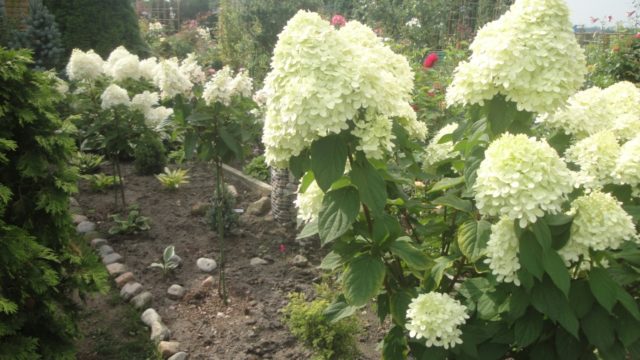
When planting Skyfall in a row, between the seedlings it is necessary to make indents of 70 cm
Hydrangea can be planted as a free-standing shrub, or in small groups, forming massive flower beds. However, it is best to combine planting it with cereal ornamental plants - imperata, fescue and pogonaterum.
Winter hardiness of Skyfall hydrangea
Most artificially bred varieties are specially designed to grow in harsher conditions. In addition to external beauty and a longer flowering period, breeders are trying to improve the parameters of winter hardiness. Thanks to this approach, Skyfall successfully takes root both in the sharply continental climate of the Ural and Siberian regions, and in the northwestern regions of Central Russia.
A properly planted plant can easily survive a temperature drop of up to -30 degrees in winter. Since such a temperature happens extremely rarely in the central regions of the country, you will not have to worry about the safety of the bush.If the winter is snowy and harsh, then experienced gardeners recommend covering the hydrangea bushes with spruce branches or roofing material.
Planting and caring for Skyfall panicle hydrangea
In order for the shrub to please with abundant flowering and a healthy crown, it needs constant care. Like most artificially bred varieties, hydrangea is less demanding on small disadvantages of agricultural technology. Among the most important points when caring for her are:
- periodic watering;
- applying dressings;
- shrub pruning;
- preparation for winter;
- correct fit.
It is very important to choose a quality seedling. He must have a developed root system and pronounced shoots. The best time for planting is early spring, when the seedling has not yet bloomed its buds. You can also plant in the fall - right after the leaves fall.
Selection and preparation of the landing site
It is important to choose a suitable place for any plant. Skyfall prefers fertile soil. Chernozem or podzolic soils are best suited for cultivation. The soil should be well drained so that accumulated water does not spoil the roots of the shrub.
It is very important that the site chosen for planting is not too open. Constant exposure to direct sunlight can be detrimental to the health of the hydrangea and become one of the reasons for its wilting. It is best to plant it between large trees or on the west side of the site.
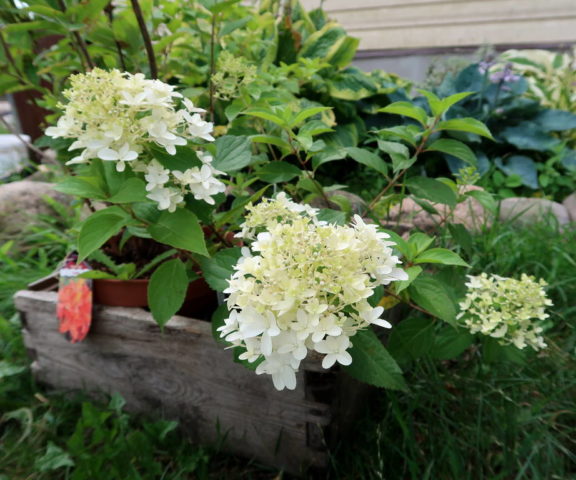
To shelter Skyfall from the sun and strong winds, she is planted near the walls of the house.
Hortense does not like strong winds. The best place for planting it will be a flower bed adjacent to the wall of the house or located next to the fence. So that young seedlings do not break under a strong wind, immediately after planting next to the bushes, it is recommended to put up supports and tie shoots to them.
Landing rules
A week before planting seedlings in open ground, it is necessary to prepare planting pits. The optimal dimensions of the recess are 50x50x50 cm. 2 buckets of water are poured into each of the pits. A day later, the bottom is covered with a layer of drainage.
As a basis for it, you can use:
- large pebbles;
- broken brick;
- charcoal;
- expanded clay.
The sheet soil is mixed with sand in a 2: 1 ratio. 50 g of superphosphate is also added to the resulting soil for faster rooting of the seedling. A supporting support is installed in the center of the pit.
The roots of Skyfall are straightened, after which the seedling is lowered into the planting pit. Sprinkle it with prepared soil so that the root collar is at ground level. Immediately after planting, the seedling is abundantly watered and mulched with sawdust.
Watering and feeding
Hydrangea paniculata hydrangea paniculata skyfall is a moisture-loving plant. For healthy development, it is recommended to water it every 3-4 days. 2-3 buckets are poured under the bush. It is best to use soft water that has been kept in a barrel for several days.
In addition to abundant watering, each flowering shrub needs periodic fertilization. Superphosphate is best suited for the proper functioning of the Skyfall hydrangea. It is brought in in the spring before the first buds appear. In the summer, Skyfall is fertilized with urea. In the autumn period, cow dung is introduced into the soil around the plantings of ornamental shrubs.
Pruning Skyfall panicle hydrangea
Every shrub needs periodic pruning. Neglect of such a procedure can cause a lack of nutrition for all shoots. There are 3 types of pruning needed - sanitary, shaping, and rejuvenating.
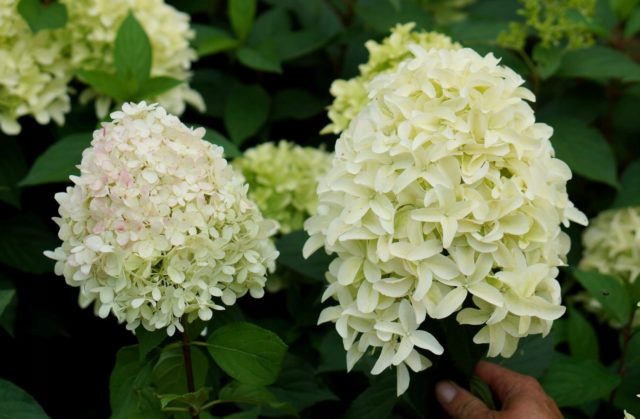
Timely pruning is the key to the lush flowering of hydrangeas
In the first case, we mean the removal of dead shoots after the winter period. Dried branches are completely cut with a secateurs. Formative pruning is needed to create a beautiful crown.Rejuvenation is necessary to remove the oldest shoots.
Preparing for winter
The artificially bred Skyfall variety easily tolerates winters in central Russia. In harsher climates, hydrangeas need to be prepared for difficult conditions. Subject to a set of measures, the shrub can easily cope with temperatures up to -30 degrees.
The first step is to increase the mulch layer. It allows you to keep warm in the area of the root system. If forecasters promise a winter with little snow, the layer of mulch must be increased to 10-15 cm. The shrub is insulated with spruce branches, and then covered with roofing material or canvas.
Reproduction
A large amount of planting material can be obtained from one bush of Skyfall hydrangea. Like most ornamental plants, it is propagated in two ways - by cuttings and branches.
To obtain cuttings of Skyfall hydrangea, the apical shoots with 2-3 buds are cut in the summer. They are immersed in clean water for 3-4 weeks. During this time, the primary root system is formed. After that, the cuttings are transplanted into pots and grown at home for a year before planting in open ground.
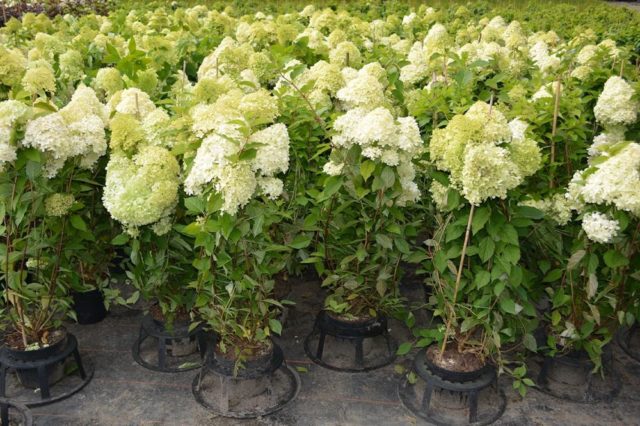
Seedlings are rooted in the ground upon reaching one or two years
For reproduction by branches, lateral shoots are bent close to the ground in early spring. They are fixed with pins, after which they are covered with earth by 2-3 cm. At the end of August, the rooted plant is transplanted to a new place.
Diseases and pests
Despite the fact that modern breeding is trying to minimize the damage to plants by other organisms, hydrangea remains susceptible to various diseases. Diseases and pests can affect not only the leaves and shoots of Skyfall, but also its root system.
Most often, hydrangea is affected by:
- ring spot;
- rust;
- chlorosis;
- fungal diseases.
Among the pests, leaf aphids, spider mites and garden slugs are distinguished. It is important to remember that as soon as the Skyfall hydrangea has shown signs of disease, it is necessary to apply special preparations or insecticides as soon as possible. A neglected disease can completely destroy the plant.
Conclusion
Hydrangea paniculata Skyfall is becoming more and more popular in home gardens. Enormous flowering buds brighten the landscape with vibrant white blooms. With the right agricultural technology, you can get a magnificent plant, pleasing with its appearance for a long time.
Reviews of hydrangea Skyfall








